PHUKET: The letter from the Rights and Liberties Protection Department of the Justice Ministry proved to be a delivery straight from Orwell, with perhaps a touch of Kafka for good measure.
We learned in the official document that our application to have a sum provided through the department to meet bail on Computer Crimes Act and criminal defamation charges had been rejected. Fair enough, we thought.
Because of the unprecedented legal action by the Royal Thai Navy, our advertising revenue at Phuketwan had gradually disappeared. But we are not yet quite among the poor and the desperate.
Then at the end came the lines, which my colleague, Chutima Sidasathian, translated from the Thai language. She frowned as she read it:
''The information . . . is false and untrue. The journalists must be correct and recheck their information before publishing the story to make sure there is no danger to others. The reputation of the Royal Thai Navy was damaged and made people look down on the Navy. On the evidence we have, we believe Morison and Khun Chutima did the wrong thing.''
I frowned, too. Although the continuation of our trial was more than six months away, a committee of the Justice Ministry had found us guilty as charged.
No evidence had even been presented yet. The first witness had yet to be called. But we had already been determined to be guilty, and by a Justice Ministry committee no less.
Orwell and Kafka, how very nice to meet you both.
We are innocent. We have no intention of becoming the fall guys who take the rap for Reuters. The news agency's journalists later won a Pulitzer for a series on the Rohingya exodus from Burma that included the contentious paragraph about ''naval forces'' that we had merely republished, word for word.
Thousands of news agency articles are republished each day around the world. The consequences of us losing this case should be clear to all news outlets, and to every Twitter retweeter.
Earlier in the year, we had complained to the Ombudsman's office on Phuket because we wanted to know why the local police had proceeded with our case without the investigating officer first questioning the Navy captain who lodged the complaint. Such a basic requirement, unfulfilled.
It was an important question, but the Ombudsman's office declined to ask it.
Two visits and hours of questioning at the National Human Rights Commission of Thailand produced, months later, a ruling that because the trial had begun, the commission could make no ruling.
How odd. We hadn't actually asked for a judgement one way or another, just an opinion on whether the draconian Computer Crimes Act, in being applied against us, was being used appropriately, or whether it was actually intended for computer hackers and data thieves.
Of course, nothing like this could ever happen in Australia, could it?
And so each day, we go about reporting events on Phuket, trying to put to one side the thought of the resumption of the trial in July.
There is the ferry boat burning and sinking to cover, the police visiting the beach to seize sunbeds and umbrellas from tourists, the Muslim mass circumcision.
When doubts assail us, we reassure ourselves with the words of Martin Luther King Jr: ''Injustice anywhere is a threat to justice everywhere.''
It's a wise quotation that my colleague and I feel as though we are somehow being forced to endure, to live through.
I am in the fortunate position now where I could apply to reclaim my passport at any time, leave Thailand, and never return.
The choice for my colleague is not so easy. She loves Thailand. Her family lives here. Under no circumstances is she becoming a runner.
As she said when the letter arrived from the Rights and Liberties Protection Department of the Justice Ministry last November: ''What makes the department able to judge us, before our trial? I am deeply disappointed to see the way my country's justice system fails to operate fairly.''
The messages from supporters everywhere are encouraging, even from people quite high up in the Thai government.
So we fight on, maintaining our faith in the principle of media freedom, knowing that Martin Luther King got it right. We are innocent. We have done nothing wrong. And we still believe that in the end, justice will prevail, here and everywhere.
Most legal costs for the journalists are being met by the London-based Media Legal Defence Initiative. A group of more than 10 lawyers have teamed up in Thailand to provide legal counsel. They include the Human Rights Lawyers' Association, iLaw and SR Law. The Andaman Community Rights and Legal Aid Centre is funding bail.

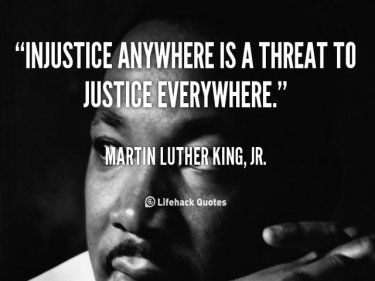
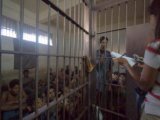

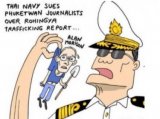
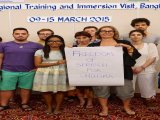


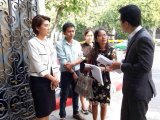
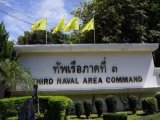

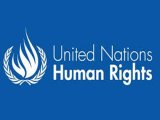

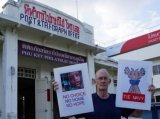



Dear Ed
It is certainly a sobering story.
You and Khun Chutima have endured considerable adversity as investigative journalists covering human trafficking. You have been a voice for people who are powerless. You have earned an abundance of respect and credibility.
One can only hope that senior people on the Thai government refuse to perpetuate the mistake of the mid-ranking officer who charged you. I hope that some leadership is shown and that the charges are dropped unconditionally.
Ian Yarwood
Solicitor - Perth, Western Australia
Posted by Ian Yarwood on May 1, 2015 18:07